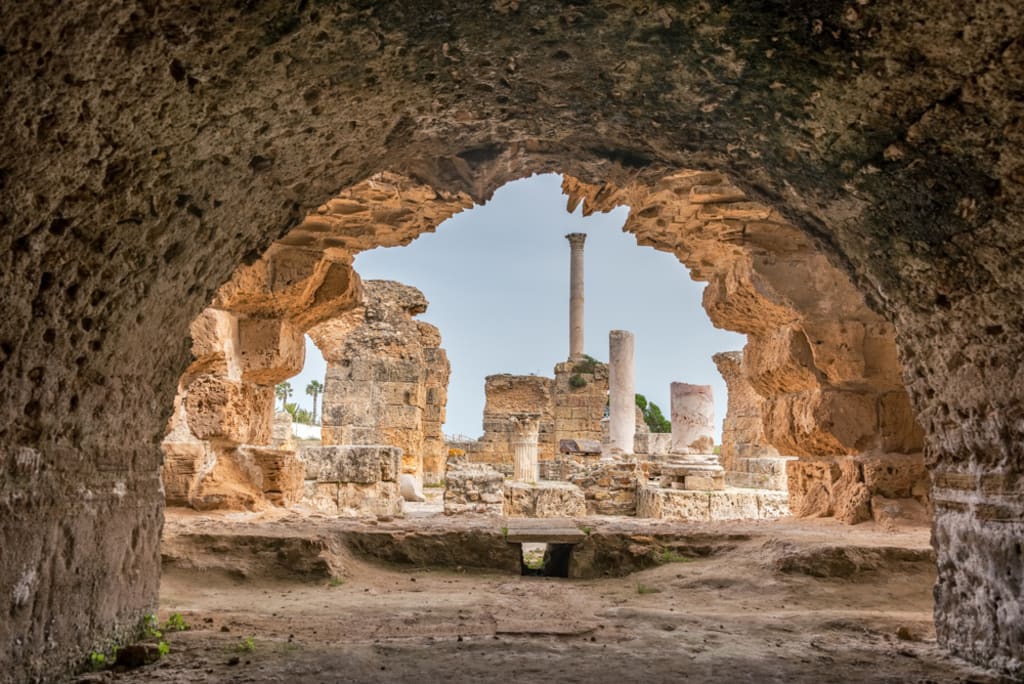
Introduction:
When looking at the map of the world, one cannot help but notice the distinctive shape of the Mediterranean Sea, resembling the hump of a camel. At the westernmost end of this hump, the name Tunisia proudly stands out. Situated as the first country in Africa from the European side and the last country from Africa, Tunisia boasts a rich history, vibrant culture, and breathtaking landscapes. Its capital, Tunis, is a city that holds remnants of the ancient empire of Carthage, which once rivalled and challenged the mighty Roman Empire. This article delves into the intriguing past of Carthage, the significance of Tunisia, and the experiences one can encounter while exploring this North African gem.
Carthage: A Glorious Empire of the Past:
Located in the suburbs of the capital city, the archaeological remains of Carthage serve as a testament to the city's illustrious past. In ancient times, Carthage was a powerful empire that successfully clashed with the Roman Empire on multiple occasions. However, the relentless attacks from the Roman emperors ultimately led to the destruction of Carthage in 202 BC. Despite its tragic fate, the remnants of Carthage continue to captivate visitors to this day. Recognizing its historical significance, UNESCO declared Carthage a World Heritage Site in 1979. The name "Tunis" originated from Carthage's role as the first place or stop, signifying its enduring legacy.
Reasons to Visit Tunisia:
In November, I embarked on a three-day journey to Tunisia, driven by various motivations. Firstly, my childhood encounters with Tunisia through textbooks and the recognition of Pakistan's support for the country sparked my curiosity. Tunisia, in gratitude, named two main roads after Quaid-e-Azam Muhammad Ali Jinnah and Patras Bukhari, Pakistani leaders who had received Tunisian passports. Secondly, my visits to Al-Qarwain University in Morocco and its connection to Tunisia intrigued me. Learning that the family responsible for building the university had migrated from Qairwan in Tunisia, I yearned to explore this significant place. The third reason stemmed from Tunisia's pivotal role in the Arab Spring, where it became the first Arab country to launch a movement against its president, Zine El Abidine Ben Ali, in 2011. Witnessing the domino effect of protests in other Arab nations inspired me to visit Tunisia and witness its political and social transformation. Lastly, the desire to trace the footsteps of renowned figures such as Tariq bin Ziyad, a Berber tribe member from Tunisia, and Ibn Khaldun, a renowned scholar born in Tunisia, further fueled my interest in this captivating land.
Tunisia's Cultural and Natural Splendors:
Tunisia embraces its Islamic heritage, with 99% of its population following the Maliki Sunni sect of Islam. Despite the strong religious adherence, the country exhibits a liberal atmosphere, welcoming visitors from around the world. Boasting a plethora of hotels and resorts, Tunisia's tourism industry thrives alongside its agricultural sector. The country is renowned for producing exceptional olives, ranking as the second-largest exporter of this prized fruit after Spain. Additionally, Tunisia's winemaking industry rivals its olive production, earning billions from wine exports. With half of the country covered by the vast Sahara Desert, Tunisia attracts tourists from far and wide. Notably, the first Star Wars movie was filmed in the Tunisian desert, and the sets remain popular pilgrimage sites for Star Wars enthusiasts. Sidi Bou Said, a charming mountain town with its iconic white houses, blue windows, and cobblestone streets, offers a picturesque and enchanting experience. The town's café, Sidi Chabaane, has gained global fame, and its almond tea is a must-try delicacy. Sidi Bou Said's rooftops, adorned with restaurants and cafes, provide a mesmerizing view of the sea, further enhancing the town's allure.
Hospitality, Cleanliness, and Safety:
Tunisians are renowned for their warmth, hospitality, and politeness. The country maintains a remarkably clean environment, surpassing many European cities in terms of cleanliness and beauty. Litter-free streets, minimal noise pollution, and absence of traffic congestion contribute to a tranquil atmosphere. Surprisingly, the presence of police or military personnel is rarely seen, attesting to Tunisia's reputation as a safe destination. Tunisian society is characterized by a gentle and peaceful nature, and both men and women actively participate in various fields, with women freely exercising their right to work. The Tunisian healthcare system is highly regarded, with Tunisian doctors widely recognized as specialists in Europe. As a result, many Europeans seek medical treatment in Tunisia. Furthermore, Tunisia's herbal industry flourishes, with spice and herb shops dotting the streets, emanating the alluring fragrance of jasmine, which holds great cultural significance in the country.
Conclusion:
Tunisia offers an extraordinary travel experience that seamlessly blends history, culture, natural beauty, and warm hospitality. Its connection to ancient Carthage, its pivotal role in the Arab Spring, and its renowned figures like Tariq bin Ziyad and Ibn Khaldun showcase its rich historical and intellectual legacy. Whether exploring the archaeological sites of Carthage, wandering through the charming town of Sidi Bou Said, or venturing into the vastness of the Sahara Desert, Tunisia provides a captivating journey. The country's commitment to cleanliness, safety, and respect for its visitors further adds to its appeal. Tunisia truly stands as a remarkable destination where past and present converge, leaving a lasting impression on all who venture within its borders.
Advice:
Research Before You Go: Familiarize yourself with Tunisia's rich history, cultural customs, and attractions to make the most of your visit.
Dress Appropriately: As Tunisia is an Islamic country, it is important to respect local customs and dress modestly, especially when visiting religious sites.
Learn Basic Arabic Phrases: While many Tunisians speak English, knowing a few Arabic phrases will enhance your interactions and demonstrate respect for the local culture.
Bargain with Care: Haggling is a common practice in Tunisian markets, but remember to negotiate respectfully and be aware of fair prices to avoid overpaying.
Stay Hydrated and Sun-Protected: Tunisia's climate can be hot, particularly in the summer months. Carry water, wear sunscreen, and dress comfortably to stay safe and comfortable during your visit.
Explore Beyond the Tourist Hotspots: While popular destinations like Carthage and Sidi Bou Said are must-visit locations, consider venturing off the beaten path to discover hidden gems and experience the authentic local culture.
Embrace Local Cuisine: Sample traditional Tunisian dishes, such as couscous, brik, and tajine, to savor the rich flavors and spices that characterize the country's gastronomy.
Respect Local Customs: Tunisians value politeness and respect, so always be mindful of cultural norms, such as removing your shoes when entering someone's home or refraining from public displays of affection.
Stay Informed about Safety: While Tunisia is generally safe for travelers, it is advisable to stay updated on the current situation and follow any travel advisories issued by your country's government.
Capture Memories, But Respect Privacy: Tunisia's picturesque landscapes and cultural sites offer great photo opportunities. However, always ask for permission before photographing locals, especially in more conservative
About the Creator
Naveedkk
Every written or spoken word is not necessarily according to the standards of the reader and listener. The speaker is in his own state while the listener is in his own state.






Comments
There are no comments for this story
Be the first to respond and start the conversation.